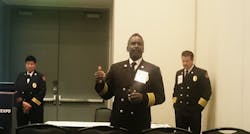Can we talk about the implications of same-sex marriage on the fire service or perhaps how the civil unrest that has occurred as a result of incidents between white police officers and black individuals in this country? Those were two scenarios posed by Randy Crider, fire chief of the Cobb County, GA, Fire and Emergency Services, at the start of the Firehouse Expo session “Courageous Conversations,” which was presented by Crider along with Cobb County Deputy Chief William Tanks and Battalion Chief Jodi Gabelmann.
The group was quick to assert, though, that the session was not just about diversity in the way that we in the fire service often thinks about diversity—as an issue about hiring people of minority status. Rather, the session is about finding unity where people often see differences—and that is a topic that goes beyond race or gender. Differences can arise among a variety of groups—career or volunteer agencies, union or non-union members, prevention or suppression, etc. The key is to focus on having the “courageous conversations” that can bridge gaps between the differences in order to find common ground or reconciliation.
The three presenters, along with other members from Cobb County Fire and Emergency Services, have been speaking on the topic of courageous conversations for some time, and they offer the program to other departments who are interested in helping their members manage conflict. The ultimate goals of the program include encouraging conversation that helps individuals learn more about each other so they can build a unified team, talking openly about things that are happening in the department and how those things may affect the team, discussing differences and similarities and how they create effective teams for workplace cohesion and effectiveness, and being proactive instead of reactive in regards to harassment, discrimination and isolation.
When it comes to having courageous conversations, the presenters explained, there are very important ground rules and principles to consider:
- This is not a free pass to harass or discriminate. There are to be no irresponsible words or comments; the intent is to learn, not harm.
- Listen to understand, and ask questions to have better understanding. Do not criticize another for asking questions and discussing issues.
- Be willing to admit that we have a different perception. Misconceptions are often due to a lack of understanding—and that is OK.
- Consider your own perceptions and assumptions.
- Give them time and space that’s needed. Sometimes thoughts and ideas need time to materialize. Establish a “parking lot” for issues to be discussed at a later time.
- Don’t underestimate the power of forgiveness. If someone is upset, it’s is OK to apologize. Hating hurts the hater more than the hated. Character is shown through asking for and giving forgiveness.
- Respect one another for their own values, thoughts and ideas. You don’t have to agree with each other, but we should respect each other.
Chief Crider reminded that we all have our own biases, many of which are as a result of our upbringing, education or a variety of other factors over which we often have no control. We can develop deeply rooted beliefs that support our way of thinking—and dismiss others. But he posed the question, “If we have so little to do with who we are as a person, what gives us the right to think that someone who is different than we are is wrong?” He reminded that our beliefs are a product of so many factors, and we must remember that when asking ourselves why someone believes what they believe or acts the way they act.
The group played a series of video vignettes that they created at their department to spark discussion among attendees. The initial vignettes showed examples of bullying, discrimination and harassment at the station. The second set of vignettes showed examples of how members can respond with courageous conversations. They asked attendees to consider several questions after watching the videos: What issue might arrive with the actions in the video? How might you handle this situation? How might this situation be prevented?
Chief Crider underscored that because there are so many differences among us, dealing with these issues is not a matter of “if”; it’s a matter of “when.” And better yet, he asked, how do we prevent these issues from escalating to a boiling point? The key is conversation. One caveat, however, is that not everyone will be ready for a courageous conversation. It has to work both ways, so if one person is not interested in following the ground rules, then it likely will not be possible to mitigate the situation without additional support or input from a higher level.
Chief Crider encouraged anyone who is interested in learning more about courageous conversations to contact him at [email protected] or (770) 528-8000.
About the Author

Janelle Foskett
Janelle Foskett served as editorial director of Firehouse Magazine and Firehouse.com, overseeing the editorial operations for the print edition along with working closely with the Web team.
